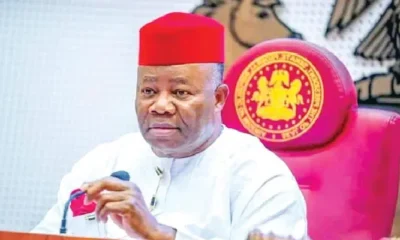Headline
BREAKING: Tinubu Signs Electricity Act In Law

BREAKING: Tinubu Signs Electricity Act In Law
President Bola Ahmed Tinubu has assented to the Electricity Act 2023, which was initially passed by lawmakers in July 2022.
This is coming less than 24 hours after the president had signed into law a bill extending the retirement year of judges from 65 to 70.
The Electricity Act will replace the electricity and Power Sector Reform Act of 2005. It provides a framework to guide the post-privatization phase of the Nigerian Electricity Supply Industry (NESI), as well as encourage private sector investments in the sector.
The bill also empowers states, companies, and individuals to generate and transmit electricity.
The Electricity Act now consolidates all legislations dealing with the electricity supply industry to provide an omnibus and ideal institutional framework to guide the post-privatization phase of the Nigerian Electricity Supply Industry and encourage private sector investments in the sector.
The primary aim of the bill, as stated in its very first section, is to create a comprehensive legal and institutional framework to guide Nigerian Electricity Supply Industry (NESI).
The bill will allow de-monopolises the generation, transmission, and distribution of electricity at the national level to empower states, companies, and individuals to generate, transmit, and distribute electricity.
States would also be able to issue licenses to private investors who have the ability to operate mini-grids and power plants within the state, but such a state license are not to extend to inter-state or transnational distribution of electricity.
Under the Nigeria Electricity Bil, electricity generation licenses are obligated to meet renewable generation obligations as may be prescribed by NERC. As such, electricity generating companies will be mandated to either generate power from renewable energy sources, purchase power generated from renewable energy or procure any instrument representing renewable energy generation.
Fundamentally, the aim is to create a market for renewable energy and thereby stimulating investments in the sector.
The Electricity Act also mandates the imposition on distribution or supply licenses.
It also states that anyone may construct, own, or operate an undertaking for generating electricity, not exceeding 1 megawatt (MW) in aggregate at a site or an undertaking for distribution of electricity with a capacity not exceeding 100 kilowatts (Kw) in aggregate at a site, or such other capacity as the Commission may determine from time to time, without a license.
-

 Headline1 week ago
Headline1 week agoSee Why Court Declares Arrest Of Ex INEC Chair, Prof Mahmood Yakubu
-

 Education1 week ago
Education1 week agoFULL LIST: UI Tops Nigeria’s Best Varsity For 2026
-

 Crime1 week ago
Crime1 week agoUPDATED: Police Detain 12 Suspects Over Killing Of Arise TV Anchor
-

 News1 week ago
News1 week agoVenezuela’s Machado Clinches Nobel Peace Prize, See Her Journey To The Award
-

 Headline1 week ago
Headline1 week agoSenate Won’t Be Held Hostage By Any Member, Says Akpabio
-

 Headline1 week ago
Headline1 week ago2026 W’CUP Q: Lesotho Vs Nigeria – See Date, Time and Where To Watch
-

 Headline1 week ago
Headline1 week agoCouncil Of State Held A Close-door Meeting, Decides New INEC Chairman
-

 Headline1 week ago
Headline1 week agoFIFA U-20 W’CUP: Quarter-final Fixtures Confirmed [Full List]
-

 Education5 days ago
Education5 days agoJUST IN: Maths No Longer A Must— FG Changes Higher Institutions Admission Policy
-

 Brands and Marketing4 days ago
Brands and Marketing4 days agoWhy Naira Depreciation Is Not Necessarily Bad— IMF Explains


















